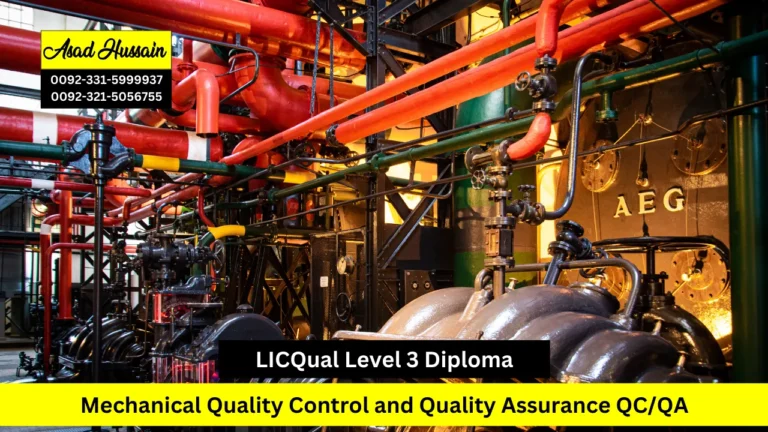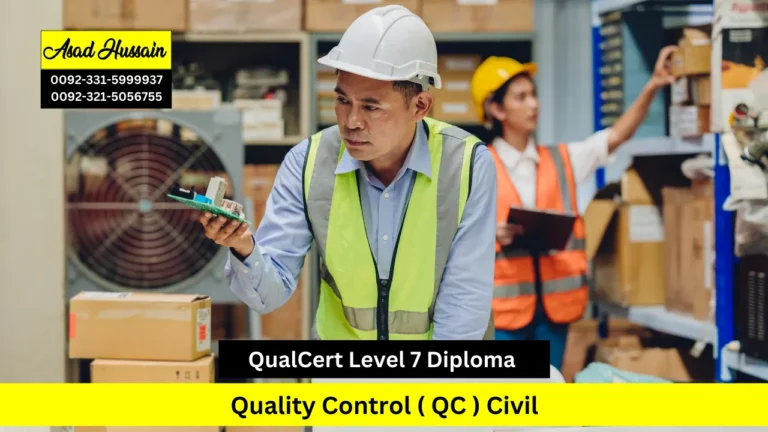The LICQual Level 7 Postgraduate Diploma in Hospital Management is a globally recognised qualification designed for healthcare professionals and administrators aiming to lead and transform modern hospital systems. In today’s rapidly evolving healthcare environment, efficient hospital management is vital for ensuring patient safety, operational excellence, and sustainable growth. This advanced qualification equips learners with the leadership, analytical, and strategic skills necessary to excel in senior hospital management and administrative roles.
LICQual Level 7 Postgraduate Diploma in Hospital Management provides an in-depth understanding of healthcare operations, organisational strategy, and effective resource utilisation. Learners gain the expertise to manage hospital functions such as patient services, clinical governance, finance, and human resources with a focus on quality and efficiency. Hospital Management comprehensive curriculum ensures that graduates are capable of addressing complex challenges in healthcare delivery, service improvement, and institutional management.
Through the Level 7 Postgraduate Diploma in Hospital Management, participants develop advanced competencies in leadership, risk management, financial planning, and healthcare policy implementation. They also acquire the ability to design and lead strategic initiatives that enhance hospital performance, patient outcomes, and overall service quality. The course empowers professionals to make data-driven decisions and foster a culture of innovation within healthcare organisations.
Program Highlights
Mandatory Units
- Strategic Hospital and Healthcare Management
- Healthcare Policy, Governance, and Compliance
- Financial and Resource Management in Hospitals
- Quality, Safety, and Patient-Centred Care
- Digital Transformation and Innovation in Hospital Management
- Global Healthcare Leadership and Research Project
The LICQual Level 7 Postgraduate Diploma in Hospital Management welcomes professionals who are passionate about advancing their leadership and administrative skills in healthcare and hospital management. Hospital Management is designed for individuals seeking to enhance their expertise in healthcare operations, policy development, and strategic hospital governance. To ensure learners have the foundational skills necessary for success, certain academic and professional entry requirements must be met.
Age Requirements:
• Learners must be 21 years of age or older at the time of enrolment.
• Mature applicants with relevant management or healthcare experience may also be considered on a case-by-case basis.
Educational Requirements:
• A recognised Level 6 qualification or equivalent in healthcare management, public health, business administration, or a related discipline.
• Candidates holding a bachelor’s degree in medicine, nursing, or healthcare administration are strongly encouraged to apply.
• Applicants with alternative academic backgrounds may be accepted if they can demonstrate appropriate professional experience in healthcare or management.
Professional Experience:
• A minimum of three years of relevant work experience in healthcare, hospital administration, or a managerial role.
• Professionals currently employed in hospitals, clinics, or healthcare systems are highly suited for this programme.
• Candidates with experience in managing healthcare operations, policy implementation, or organisational leadership will have a distinct advantage.
English Language Proficiency:
• Learners must possess a good command of written and spoken English to effectively participate in the course.
• Non-native English speakers are required to provide evidence of English proficiency through IELTS (minimum 6.0) or an equivalent qualification.
• Applicants with previous education or professional experience in an English-speaking environment may be exempt from this requirement.
The LICQual Level 7 Postgraduate Diploma in Hospital Management is structured to accommodate professionals from diverse backgrounds while maintaining rigorous academic and professional standards. For those looking to progress further, the LICQual Level 8 Diploma in Strategic Management and Leadership serves as an excellent follow-up qualification, enhancing expertise in high-level decision-making and organisational governance. Meeting these entry requirements ensures that learners are fully prepared to succeed in this globally recognised and career-enhancing programme.
The LICQual Level 7 Postgraduate Diploma in Hospital Management is designed to provide learners with the advanced knowledge, managerial insight, and practical expertise required to excel in leadership roles within hospitals and healthcare systems. This programme blends strategic management, healthcare policy, financial planning, innovation, and research to prepare professionals for the complexities of modern hospital administration. Learners will gain the competencies to lead multidisciplinary teams, implement evidence-based strategies, and ensure high standards of patient care and organisational performance across healthcare settings.
Strategic Hospital and Healthcare Management
• Develop the ability to design and implement strategic management plans that enhance hospital performance and operational efficiency.
• Evaluate leadership models and apply effective strategies for leading diverse teams in complex healthcare environments.
• Analyse internal and external healthcare environments to identify growth opportunities and mitigate organisational risks.
• Integrate evidence-based management practices to align hospital operations with long-term strategic objectives.
• Apply principles of organisational behaviour and change management to drive innovation and institutional improvement.
Healthcare Policy, Governance, and Compliance
• Demonstrate understanding of healthcare governance structures and their role in ensuring accountability and transparency.
• Interpret and apply national and international healthcare policies and regulatory frameworks to hospital operations.
• Assess compliance requirements and develop internal policies that align with legal, ethical, and accreditation standards.
• Evaluate the impact of healthcare legislation and policy changes on hospital performance and patient outcomes.
• Develop strategies to strengthen ethical leadership and governance culture within healthcare organisations.
Financial and Resource Management in Hospitals
• Apply financial management tools to develop hospital budgets, control costs, and allocate resources effectively.
• Interpret hospital financial statements and analyse performance indicators to ensure fiscal responsibility.
• Evaluate investment opportunities and resource utilisation strategies to enhance hospital efficiency and profitability.
• Design and implement procurement and supply chain management systems that support sustainable healthcare delivery.
• Develop financial risk management strategies that ensure the long-term stability of healthcare institutions.
Quality, Safety, and Patient-Centred Care
• Implement quality management systems to improve healthcare delivery and patient satisfaction.
• Analyse risk management frameworks and develop strategies to minimise medical errors and enhance patient safety.
• Apply performance improvement methodologies to monitor, evaluate, and elevate service delivery standards.
• Promote patient-centred approaches that foster compassion, trust, and communication in healthcare environments.
• Develop and apply clinical governance models to ensure continuous quality improvement and compliance with care standards.
Digital Transformation and Innovation in Hospital Management
• Evaluate the role of technology in transforming healthcare delivery, patient care, and hospital operations.
• Apply digital tools and data analytics to improve decision-making, resource planning, and operational efficiency.
• Develop strategies for implementing electronic health records, telemedicine, and smart healthcare solutions.
• Examine the ethical, security, and privacy challenges associated with healthcare digitalisation.
• Promote a culture of innovation and technological adaptability within hospital management practices.
Global Healthcare Leadership and Research Project
• Demonstrate advanced leadership competencies through the design and execution of a comprehensive research project.
• Apply research methodologies to analyse real-world challenges in hospital and healthcare management.
• Interpret data and present evidence-based solutions to support strategic improvements in healthcare organisations.
• Evaluate global trends in healthcare leadership and apply cross-cultural management approaches to diverse environments.
• Produce a professional research report that contributes to the body of knowledge in hospital management and leadership.
Upon successful completion of the LICQual Level 7 Postgraduate Diploma in Hospital Management, learners will possess the expertise to manage hospitals and healthcare institutions strategically and efficiently. They will be equipped to lead with confidence, ensuring patient safety, service quality, and operational excellence while adapting to evolving global healthcare trends. This prestigious qualification serves as a pathway to senior management positions or further academic progression, such as the LICQual Level 8 Diploma in Strategic Management and Leadership, enabling professionals to make impactful contributions to the healthcare industry worldwide.
The LICQual Level 7 Postgraduate Diploma in Hospital Management is an internationally recognized qualification designed for healthcare professionals, administrators, and leaders who aspire to excel in hospital and healthcare management. This advanced program equips learners with the strategic insight, managerial expertise, and analytical capabilities needed to navigate the complexities of modern healthcare systems. With a strong emphasis on leadership, innovation, patient-centred care, and global healthcare practices, the qualification empowers professionals to manage hospitals efficiently, ensure operational excellence, and lead with a vision for sustainable and high-quality healthcare delivery.
Healthcare Leaders and Managers
• Professionals currently in or aspiring to senior management and executive roles within hospitals, clinics, and healthcare organizations.
• Managers responsible for overseeing hospital operations, workforce management, and organizational development.
• Individuals aiming to enhance their leadership, strategic planning, and decision-making skills in healthcare administration.
• Leaders focused on improving patient outcomes through operational efficiency, staff engagement, and evidence-based management.
• Administrators dedicated to shaping healthcare institutions that prioritize quality, safety, and strategic growth.
Healthcare Professionals and Practitioners
• Doctors, nurses, and allied health professionals seeking to transition into hospital leadership and administrative positions.
• Practitioners interested in integrating clinical expertise with managerial and strategic competencies.
• Healthcare professionals aiming to enhance hospital performance through innovation, resource optimization, and effective team coordination.
• Clinicians committed to implementing patient-centred care models and quality improvement frameworks in healthcare delivery.
• Learners aspiring to strengthen their ability to manage multidisciplinary healthcare environments and lead transformation initiatives.
Hospital and Healthcare Administrators
• Professionals overseeing hospital departments such as operations, human resources, finance, or quality management.
• Individuals responsible for implementing hospital policies, compliance systems, and performance evaluation frameworks.
• Managers aiming to improve institutional governance, operational processes, and resource utilization efficiency.
• Administrators developing systems that align hospital objectives with national and international healthcare standards.
• Leaders driving strategic growth and sustainable healthcare delivery through effective administration and change management.
Policy Makers and Healthcare Governance Professionals
• Policy makers and senior officials engaged in designing and implementing healthcare regulations and governance structures.
• Professionals contributing to hospital accreditation, healthcare reforms, and policy development.
• Individuals focusing on integrating governance, compliance, and ethical leadership into hospital management systems.
• Administrators responsible for ensuring adherence to healthcare laws, ethical codes, and professional standards.
• Leaders promoting transparency, accountability, and ethical decision-making in healthcare governance.
Financial and Resource Management Officers
• Finance professionals managing hospital budgets, expenditures, and financial planning processes.
• Individuals responsible for resource allocation, procurement, and cost optimization within healthcare organizations.
• Managers aiming to strengthen their financial decision-making and sustainability management capabilities.
• Officers overseeing hospital infrastructure, assets, and financial reporting aligned with strategic objectives.
• Leaders developing innovative financial models that ensure operational efficiency and long-term institutional stability.
Quality, Safety, and Patient-Centred Care Managers
• Professionals leading hospital quality assurance, risk management, and patient safety programs.
• Individuals implementing healthcare standards, accreditation procedures, and continuous improvement initiatives.
• Managers focusing on enhancing service quality, clinical governance, and patient satisfaction outcomes.
• Leaders responsible for fostering a culture of accountability, teamwork, and patient-centred care.
• Specialists aiming to develop hospital systems that uphold excellence, safety, and ethical standards of care.
Global Healthcare Researchers and Innovators
• Professionals interested in conducting applied research on global healthcare management and hospital administration.
• Individuals developing innovative solutions for healthcare challenges through evidence-based research and technology.
• Researchers analysing global healthcare systems to identify best practices and sustainable operational strategies.
• Learners aspiring to contribute to academic and professional knowledge in hospital and healthcare leadership.
• Professionals aiming to lead healthcare innovation projects, promote digital transformation, and drive global best practices.
The LICQual Level 7 Postgraduate Diploma in Hospital Management is ideal for professionals committed to advancing their leadership roles in hospital administration and healthcare governance. Graduates will gain the strategic, operational, and analytical skills required to manage complex healthcare environments effectively. This qualification opens pathways to senior positions such as Hospital Director, Healthcare Operations Manager, Policy Advisor, or Quality Assurance Director. Learners will emerge as visionary leaders equipped to transform healthcare organizations, improve patient outcomes, and promote excellence in global healthcare management.







